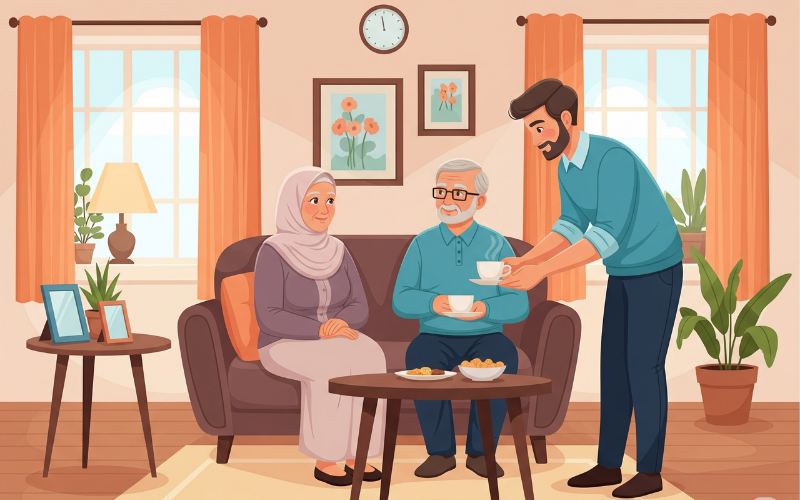Why is Respecting Parents in Islam So Important?

In this world, the most selfless and precious relationship is the one between a child and their parents. The importance of respecting parents in Islam is a profound duty, emphasized in numerous Quran verses about parents, and is far more than a mere social custom. Consider our parents: they sacrifice their comfort and peace to raise us. They stand like a mighty banyan tree, giving us shade at every turn of life. It is truly impossible to repay the debt of their infinite love and sacrifice. This responsibility is an essential part of faith (Iman) and a command from Allah the Almighty. It is a crucial chapter of life that opens the doors to success for a believer in both this world and the next.
Let’s explore our duties towards our parents in the light of the Quran, Hadith, and inspiring incidents from the lives of the Companions.
The Unparalleled Status of Parents: Key Quran Verses About Parents
In Islam, the honor and service to parents are placed second only to the worship of Allah Ta’ala. This high placement alone is sufficient to understand their profound importance. In various verses of the Holy Quran, Allah has explicitly mentioned this right.
Their Place is Right After the Worship of Allah: Allah Ta’ala says:
“And your Lord has decreed that you not worship except Him, and to parents, good treatment.”
(Surah Bani-israil, Verse: 23)
In another verse, He says:
“Worship Allah and associate nothing with Him, and to parents do good.”
(Surah An-Nisa, Verse: 36)
The Divine Directive of Gratitude: Allah commands us to be grateful to Him along with being grateful to our parents:
“Be grateful to Me and to your parents; to Me is the final destination.”
(Surah Luqman, Verse: 14)
Why is Their Status So High?: A mother’s hardship during pregnancy and childbirth is immense and unique—it is truly beyond compare. She embraces this difficulty with a smile, driven by pure love and the desire to see her child’s face.
Honor and Service: Hadith on Respecting Parents in Islam
The Messenger of Allah (ﷺ) highlighted the status of parents and the rewards of serving them in numerous Hadiths.
The Mother’s Status is Above All: A companion asked the Messenger of Allah (ﷺ),
“O Messenger of Allah! Who among the people is the most worthy of my good companionship?” The Prophet (ﷺ) replied three times, “Your mother.” When asked the fourth time, he said, “Your father.”
(Sahih al-Bukhari 5971, Sahih Muslim 2548)
The Means to Paradise and Hellfire: The Messenger of Allah (ﷺ) said:
“Parents are your Paradise and your Hellfire.” (This means you can earn Paradise by serving them and treating them well, or you can enter Hellfire by disobeying them).
(Sunan Ibn Majah 3662)
The Pleasure of Allah is in the Father’s Pleasure: The noble Prophet (ﷺ) stated:
“The Lord’s pleasure is in the father’s pleasure, and the Lord’s displeasure is in the father’s displeasure.”
(Jami` at-Tirmidhi 1899)
The Reward of an Accepted Hajj in a Single Glance: The Messenger of Allah (ﷺ) said:
“When a righteous child looks at his parents with a glance of mercy, Allah writes for him the reward of an accepted Hajj for every glance.”
(Bayhaqi, Shu’ab al-Iman 7856)
Living Responsibilities: The Practice of Respecting Parents in Islam
When our parents are with us, the opportunity to serve them is a great blessing. During this time, we have some crucial responsibilities:
1. Showing Utmost Respect, Humility, and Obedience
In their old age, parents often become as sensitive as children. Causing them the slightest distress is a grave sin. The Quranic guidance is to:
- Never say to them even a word of contempt, like “uff.”
- Do not scold or repel them.
- Always speak to them in a noble and gentle manner.
- Lower to them the wing of humility out of mercy.
- It is obligatory to obey all their commands that are not contrary to the laws of Allah.
2. Sincere Service and Care
Fulfilling their needs and taking care of their health are primary duties. Beyond physical care, providing emotional support is crucial. This means listening to their stories, valuing their opinions, and spending quality time discussing things they enjoy. Understanding and respecting their personal preferences in daily matters also shows deep honor and affection.
An Inspiring Story: Uwais al-Qarni (rahimahullah) Despite being a contemporary of the Prophet Muhammad (ﷺ), Uwais al-Qarni could not travel to Medina to meet him. He remained at home, dedicated to serving his old and ailing mother. This sacrifice was so beloved to Allah that the Prophet (ﷺ) himself praised him to the Companions and instructed Umar (ra) and Ali (ra) to seek him out and ask him to pray for the Muslim Ummah. This unique example of service to a mother is written in golden letters in the history of Islam.
3. Always Praying for Them
Praying for their health, long life, and faith is an exceptional form of worship. The best prayer taught in the Quran is:
“My Lord, have mercy upon them as they brought me up [when I was] small.”
(Surah Bani-israil, Verse: 24)
A Child’s Responsibilities After Parents Pass Away
A child’s duty does not end with the death of their parents; a new chapter begins. Ensuring their well-being in the hereafter is also our vital responsibility.
Continuous Supplication and Seeking Forgiveness: A child’s prayer is the greatest gift for deceased parents. The Messenger of Allah (ﷺ) said that when a person dies, all their deeds come to an end except for three. One of them is
“A righteous child who supplicates for him.”
(Sahih Muslim 1631)
Sadaqah Jariyah (Ongoing Charity): Giving charity on their behalf, the rewards of which they continue to receive in their graves. Examples include helping build a mosque, arranging for water access, distributing Islamic books, or sponsoring an orphan.
An Example from the Sunnah: The mother of Sa’d ibn Ubadah (ra) passed away in his absence. He asked the Prophet (ﷺ), “If I give something in charity on her behalf, will she receive the reward?
” The Prophet (ﷺ) said, “Yes.” Sa’d (ra) then gave his famous garden, “Mikhraf,” in charity in his mother’s name.
(Sahih al-Bukhari 2756)
Maintaining the Relationships They Left Behind: After parents pass away, maintaining good relations with their friends and relatives and honoring them is also a part of treating parents with goodness.
14 Responsibilities of a Child Towards Living and Deceased Parents
Based on the Quran and Hadith, Islamic scholars have outlined 14 key responsibilities. Seven are for when parents are alive, and seven are for after their death.
7 Duties While They Are Alive:
- To honor and respect them from the heart.
- To have genuine love for them and to serve them.
- To obey their commands in all matters compliant with Sharia.
- To arrange for their happiness and fulfill their needs.
- To care for them when they are sick and arrange for treatment.
- To visit them regularly and keep in touch if living far away.
- To always speak to them in a soft, respectful tone.
7 Duties After Their Death:
- To pray to Allah for their forgiveness.
- To give charity (Sadaqah) with the intention of their forgiveness.
- To honor their friends and maintain good ties with their relatives.
- To quickly arrange for the repayment of any debts they left.
- To fulfill any lawful will they have made.
- To perform Hajj or Umrah on their behalf (Badal).
- To visit their graves from time to time in accordance with the Sunnah.
Conclusion
Fulfilling our duties and respecting parents in Islam is not a burden; it is a great mercy from Allah and a stepping stone to success. Serving them is a means for our prayers to be answered and a source of blessings in every aspect of our lives. Let us serve them to the best of our ability while they are alive and remember them through our prayers and good deeds after they have passed. In the fulfillment of this duty lies our true well-being and salvation in this world and the hereafter.
May Allah grant us all the ability to perform this great responsibility correctly. Ameen!
Frequently Asked Questions
Why is respecting parents so important in Islam?
Respecting parents is a profound duty in Islam, second only to the worship of Allah (SWT). It is a command from Allah, a crucial part of faith, and a path to success in this life and the next.
What is the status of the mother in Islam?
The mother holds a very high status, even above the father. The Prophet (ﷺ) stated, when asked who is most worthy of good companionship, "Your mother," repeating it three times before saying, "Your father."
What should I do if my parents are elderly?
When parents are elderly, a child must show them utmost respect, humility, and obedience. You should never say a word of contempt, scold them, or repel them. It is also your duty to provide sincere service, care, and emotional support.




